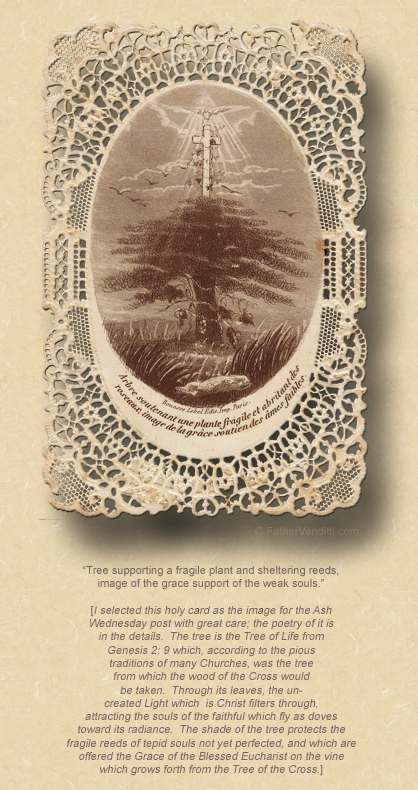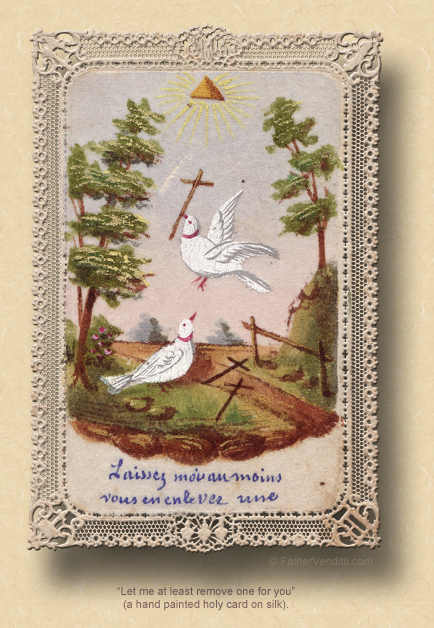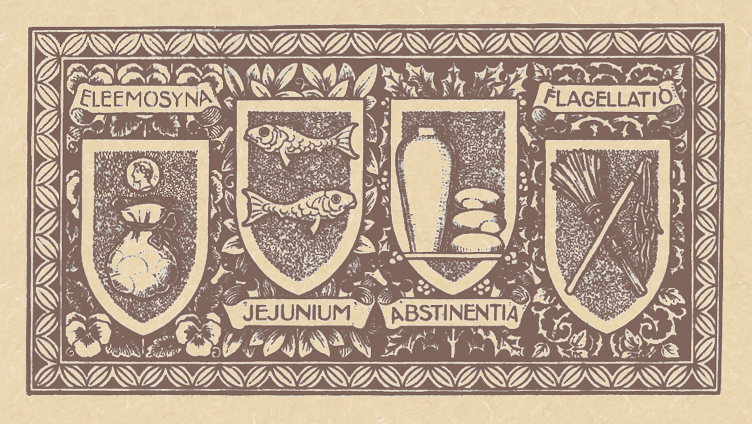"Angels with Dirty Faces."
The First Day of Lent, known as Ash Wednesday.
Lessons from the feria, according to the ordinary form of the Roman Rite:
• Joel 2: 12-18.
• Psalm 51: 3-6, 12-14, 17.
• II Corinthians 5: 20—6: 2.
• Matthew 6: 1-6, 16-18.
Lessons from the feria, according to the extraordinary form of the Roman Rite:
• Joel 2: 12-19.
• [Gradual] Psalm 56: 2, 4.
• [Tract] Psalm 102: 10.
• Matthew 6: 16-21.
The First Wednesday of the Great Fast; the Feast of the Venerable Martyr Eudoxia; and, the Feast of Our Holy Father David, Enlightener of Wales.*
Lessons for the Presanctified Liturgy, according to the Ruthenian recension of the Byzantine Rite:**
• Genesis 1: 24—2: 3.
• Proverbs 2: 1-21.
FatherVenditti.com
|
 9:10 AM 3/1/2017 — Two weeks ago last Sunday I had spoken to you about the Septuagesima Season—sometimes called Shrovetide in English speaking countries—which, in the extraordinary form of the Roman Rite, is a short season designed to ease us into the discipline of Lent; in the Byzantine Tradition it’s called the Triodion. And to explain it I had used the analogy of going swimming, and how we tend, some of us, to lower ourselves into the water gradually to avoid the shock of plunging too quickly into cold water. I also mentioned how, in the Byzantine Rite, the last two week’s of this season focus on very concrete things: Meatfare being the last week before Lent they eat meat, and Cheesefare being the last week they eat dairy products, abstaining from both throughout the whole of Lent. 9:10 AM 3/1/2017 — Two weeks ago last Sunday I had spoken to you about the Septuagesima Season—sometimes called Shrovetide in English speaking countries—which, in the extraordinary form of the Roman Rite, is a short season designed to ease us into the discipline of Lent; in the Byzantine Tradition it’s called the Triodion. And to explain it I had used the analogy of going swimming, and how we tend, some of us, to lower ourselves into the water gradually to avoid the shock of plunging too quickly into cold water. I also mentioned how, in the Byzantine Rite, the last two week’s of this season focus on very concrete things: Meatfare being the last week before Lent they eat meat, and Cheesefare being the last week they eat dairy products, abstaining from both throughout the whole of Lent.
While this may seem overly strict for those with no experience outside the Latin Church after Vatican II, these esoteric practices had—and still have, for those who worship in those Traditions—a very pragmatic purpose: Jesus didn’t just sit down and think about what it would be like to fast for forty days in the desert, and then contemplate how that might change him; he actually went there and actually fasted. And while we might be thankful that we are not Eastern Christians and don't have to do that kind of fasting, the relevancy of that example should not be dismissed out of hand. If my Lent consists of: “I’ll give up desserts; I’ll cut an hour of my Facebook time; I’ll say an extra ten minutes of prayers each night…,” that’s nice, but it’s not Lent, because it’s all just symbolic. That's why I've never been a particular fan of “giving up something” for Lent. A symbol, whether it be a picture or a word or a symbolic gesture like a token sacrifice, no matter how meaningful it may seem to us, is still just a ghost. If it has no substance, it cannot change me concretely. But if my Lent is not just a symbol, if it is something which I allow to completely reorient my life, turning me away from the things of this world toward the things of God to the extent that my state if life permits, then over the course of a lifetime of Lents it can make the difference between heaven and hell. And that—at the risk of sounding amusingly tempered—is not insignificant.
Which brings us to the Gospel lesson for this day, which, on the surface, seems little more than some pragmatic admonitions by our Lord about the sincerity of our penitential acts: don't make a show in giving alms, don't make a spectacle of yourself when you pray, don't alter your appearance so everyone can see your mortification; nothing that we all don't know instinctively, though it does sometimes lead us to be a little judgmental of others: we go to work or to the store on Ash Wednesday and we see people walking around with enormous crosses of ash smeared on their foreheads, and we find ourselves thinking, “Is that person really living a Christian life, or is he or she just thinking superstitiously, that getting ashes smeared on his head is some kind of magic charm that will protect him from “cooties”? Then, if we're lucky, we realize that that kind of judgmental-ism is not at all in the spirit of Lent, and we stop ourselves. This happens to me all the time, when some simple soul will come here to the Shrine and be moved by what he or she experiences, and ends up in front of the statue of the Immaculate Heart, blurting out prayers out loud for all to hear; it's very difficult for me not to judge that person rather harshly and presume they're doing it to be seen and not simply out of devotion, since true devotion has no need to be seen by others, as our Lord Himself explains in the Gospel lesson.  But then I have to stop myself and recognize that I don't have the gift of knowledge like the Curé of Ars, with the ability to see into someone's soul. I can shut them up because they're disturbing the prayer of others, but I can't judge them. But then I have to stop myself and recognize that I don't have the gift of knowledge like the Curé of Ars, with the ability to see into someone's soul. I can shut them up because they're disturbing the prayer of others, but I can't judge them.
During the season of Lent, we're going to be getting a lot of Scripture lessons at Holy Mass that pertain to mortification, fasting, prayer and sincerity in our actions; and, when we hear them, the temptation will always be to apply them to everyone but ourselves: we'll be sitting in the pew and hear our Lord say something, and the first thing that pops into our head is, “Gee, I hope So-and-so heard that”; we often don't bother to ask whether we heard it ourselves. It reminds me of something I learned very early on when I was first discerning my vocation, and had experimented with the monastic life among the Carthusians, a community of hermits founded by Saint Bruno, and this story you've heard before. In his monastic rule, written in the year 1050, he makes a statement that I believe can be adapted as a suitable item for anyone's examination of conscience, particularly during Lent: he says that, whenever you see a brother doing anything that is forbidden,—whether it's conversing with a woman, or entering a shop, or eating meat, or anything at all the monks do not do—instead of running to the prior to “rat him out,” just assume he has permission; your job is to purify your own soul, not to police someone else's.
So, today we bless ashes made from the burning of the palms from last year's Palm Sunday; and, in a tradition that goes back a thousand years, we are marked with those ashes as a symbol of our desire to do penance and purify our lives. But, like all symbols, it has the potential to be meaningless if we receive it in a superstitious way, or if it's just there for others to see. Personally, I wash mine off after Mass, especially after what our Lord says in today's Gospel lesson about washing your face and not altering your appearance. I like the new translation, in which our Lord says, “anoint your head and wash your face”; the old translation said, “wash your face and comb your hair,” which didn't mean a whole lot to me. I'm not telling you that you should wash off your ashes; that's just what I do. But whether you wash them off or leave them there, don't forget that the mark on your head does no good if it is not accompanied by a mark on your soul; and, the best way to determine that is how you treat and judge others.

* Eudoxia, a nun, lived under Emperor Trajan (98-117), and was martyred at Heliopolis in Lebanon.
Not much is known for certain about the patron saint of Wales, though it's commonly held that he was born sometime between the mid-fourth and early fifth centuries, and served as bishop of Mynyw (now known as the city of St. Davids), a portion of larger Roman Briton that remained Christian after the pagan invasions of the Saxons and Angles. He is traditionally believed to be the son of Saint Non and the grandson of Ceredig ap Cunedda, king of Ceredigion. The Welsh annals place his death in the year 569, but this was later revised to 601. He is one of a few pre-schismatic Roman Catholic saints whose feast remains on most Orthodox and Eastern Catholic calendars.
** In the Byzantine Tradition, the Divine Liturgy is not celebrated except on Saturdays and Sundays throughout the Great Fast. In some traditions, the faithful are expected to fast from the Blessed Eucharist during this time, abstaining from Holy Communion except on those days on which the Liturgy is allowd. In other traditions, including the Ruthenian recension, Holy Communion may be distributed to the faithful daily provided that the Divine Liturgy is not celebrated. On Wednesday and Friday evenings, the Divine Liturgy of Presanctified Gifts is celebrated, consisting of Solemn Vespers coupled with a Communion Service in which the Eucharist confected on the previous Sunday may be received by the faithful. On Mondays, Tuesdays and Thursdays, another service—usually the Sixth Hour of the Divine Office—may be celebrated at which Holy Communion may also be offered to the faithful. The readings for these services do not include a Gospel lesson except on certain important Holy Days and during Holy Week.
|

